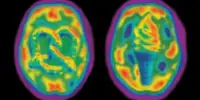The link between blood sugar levels and Alzheimer’s disease is still being studied. While there is some evidence that suggests a link between high blood sugar levels and an increased risk of Alzheimer’s disease, it is important to note that this is a complex area of research, and more research is needed to fully understand the relationship.
Early detection and treatment of Alzheimer’s disease necessitates the use of dependable and cost-effective screening methods. Researchers at Sweden’s Karolinska Institutet have discovered that the level of tau, a protein that plays a critical role in the development of severe dementia, is associated with a type of sugar molecule in blood. The study, which is published in Alzheimer’s & Dementia, can pave the way for a simple screening procedure able to predict onset ten years in advance.
“The role of glycans, structures made up of sugar molecules, is a relatively unexplored field in dementia research,” says the study’s first author, Robin Zhou, a medical student and affiliated researcher at Karolinska Institutet’s Department of Neurobiology, Care Sciences and Society (NVS). “In our study, we show that blood levels of glycans are altered early in the disease’s development.” This could mean that we’ll be able to predict the risk of Alzheimer’s disease using only a blood test and a memory test.”
Alzheimer’s disease causes the neurons in the brain to die, which is thought to be caused by an abnormal accumulation of the proteins amyloid beta and tau. Clinical trials for Alzheimer’s drugs show that treatment should commence early in the pathological process, before too many neurons have died, to reverse the process before it is too late.
The role of glycans, structures made up of sugar molecules, is a relatively unexplored field in dementia research. In our study, we show that blood levels of glycans are altered early in the disease’s development.
Robin Zhou
More blood biomarkers needed
Individuals with diabetes or impaired glucose tolerance may have a higher risk of developing Alzheimer’s disease than those with normal blood sugar regulation, according to research. Furthermore, elevated blood sugar levels have been linked to increased brain inflammation, oxidative stress, and the formation of amyloid plaques and neurofibrillary tangles, all of which are hallmarks of Alzheimer’s disease.
Non-invasive Alzheimer’s disease screening methods are both practical and financially necessary. Markers in blood are preferable, as taking samples of the cerebrospinal fluid is more difficult and brain imaging is expensive.
Researchers at Karolinska Institutet have now shown that the level of a certain glycan structure in blood, denoted bisected N-acetylglucosamine, can be used to predict the risk of developing Alzheimer’s disease.

The research team has previously shown a link between tau protein and glycan levels in Alzheimer’s disease patients, but these analyses were done on cerebrospinal fluid. Glycans are sugar molecules found on the surface of proteins, the building blocks of life, and they determine where and how these proteins function in the body.
Researchers discovered that individuals with matching levels of glycans and tau were more than twice as likely to develop Alzheimer’s-type dementia.
“We also show that a simple statistical model that take into account blood glycan and tau levels, the risk gene APOE4 and a memory test, can be used to predict Alzheimer’s disease to a reliability of 80 per cent almost a decade before symptoms such as memory loss appear,” says corresponding author Sophia Schedin Weiss, docent at NVS, Karolinska Institutet.
17-year follow-up
The results are based on 233 participants of the Swedish National Study on Aging and Care in Kungsholmen (SNAC-K). The samples were collected between 2001 and 2004, and the participants were monitored regularly with respect to factors such as memory loss and the presence of dementia. The follow-ups were carried out every three to six years and continued for 17 years.
The researchers will now analyze blood samples from the remaining SNAC-K study participants, as well as participants in other aging studies in and out of Sweden.
“We’re working with primary care researchers in Sweden to evaluate different biomarkers for dementia in primary health care centers,” says Dr. Schedin Weiss. “We hope that glycans in the blood will be a valuable addition to current methods of screening people for Alzheimer’s disease, allowing the disease to be detected early.”
It is worth noting that Alzheimer’s disease is a complex neurodegenerative condition with multifactorial causes, and more research is needed to fully understand the relationship between blood sugar levels and disease progression. If you have questions about Alzheimer’s disease or blood sugar control, it’s always a good idea to speak with a healthcare professional who can give you personalized advice based on your specific situation.















